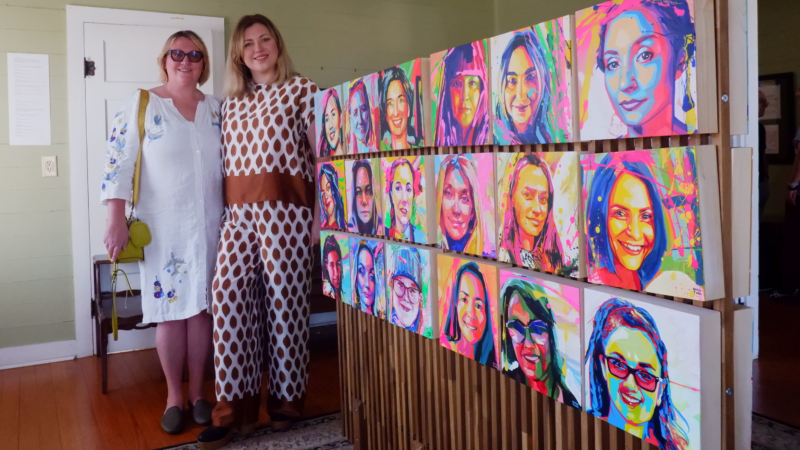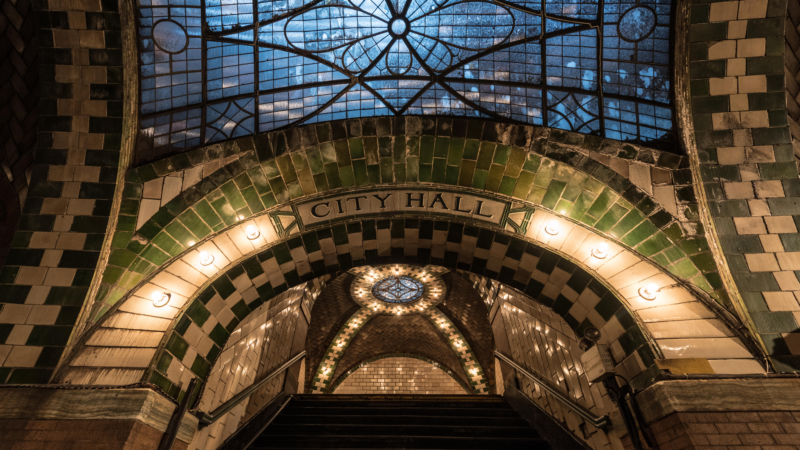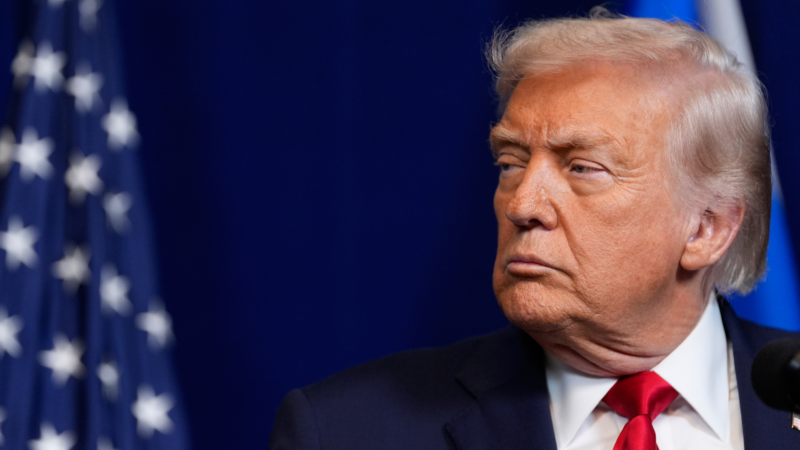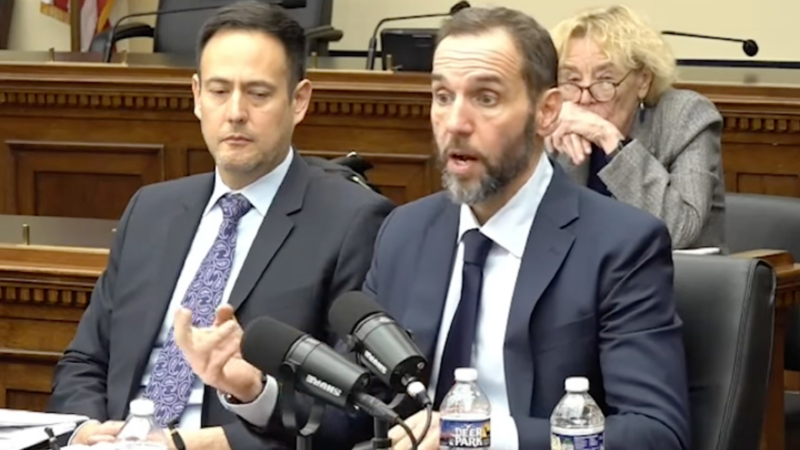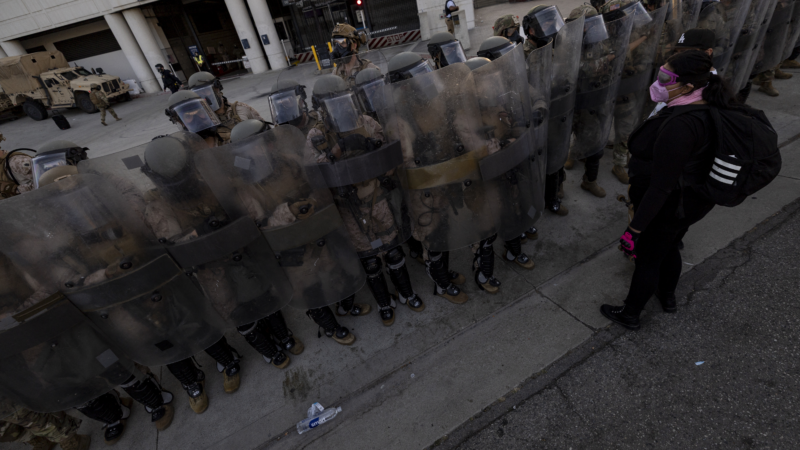Ukrainians in the U.S. use connections and their art to support the war effort
LEANDER, Texas — For one afternoon in this suburb of Austin, an 1860s farmhouse was transformed into a Ukrainian cultural center. Vendors sold Ukrainian art and traditional clothing while performers sang Ukrainian pop music. A bake sale featured homemade varenyky, a dumpling similar to the Polish pierogi.
The main attraction at the “Many Faces, One Force” exhibit was artist Iana Nikutina’s collection of 77 paintings of Ukrainian and American women from Central Texas. Nikutina said the brightly colored pop art portraits highlight the ways women support Ukrainians.
“A lot of women teach children, some volunteer in different organizations, some help the Ukrainian army,” Nikutina said. “And I wanted to appreciate these women for their work.”
The United States is home to more than 1 million people of Ukrainian ancestry, according to the U.S. Census’ most recent data.
As Russia’s war in Ukraine passes the three-year mark, some work to reinvigorate public awareness with events like the “Many Faces, One Force” exhibit.
Others contribute to the almost $4 billion Ukraine receives in yearly remittances. Some feel uncertain about President Trump’s approach to the Ukraine–Russia conflict and say they need to support their homeland now more than ever.
Composer and pianist Alex Syedin performed at the exhibit, his way to support his friends and loved ones back in Ukraine.
“What can we do as artists?” Syedin asked. “I decided to create a solo piano album about what’s going on in Ukraine and it’s called Out of Homeland.”
Without using a single word, Out of Homeland conveys the range of emotions Syedin feels about the conflict. The song “Far From Home” opens with a somber, reflective tone before building to a hopeful crescendo.
The album ends with “Fight for the Future,” which features dramatic arpeggios dancing around a bassy chord progression — evoking cries for peace ringing out over footsteps of a protest march.
Syedin came to the U.S. as a refugee in 2022, thanks to a Biden-era Uniting for Ukraine program, which was implemented after Russia’s full-scale invasion of Ukraine that year. Syedin said he feels safe on American soil but now he wants to help his musician friends back in Ukraine.
“For example, if I need to record some cellists or violins, I send all of that to my friends in Ukraine,” Syedin said. “I know they need to have a job too.”
Although some of his friends died in the conflict, Syedin said his music helps him stay hopeful that peace will come soon.
“It’s so hard to think about what I can do,” Syedin said. “I help by my music.”
Organizer Kate Voinova said the event also connects local Ukrainian Americans with the broader Central Texas community.

Fears of Russian influence
Voinova works with Liberty Ukraine, an Austin-based nonprofit organization that raises money to buy protective equipment for Ukrainian soldiers. Liberty Ukraine also contributes funding to a children’s hospital in Lviv, Ukraine, so it can accommodate new patients evacuating from the front lines.
Another one of the group’s programs sends the children of soldiers who died in the war to a therapy camp.
As the war enters its fourth year, Voinova is confident that Ukraine will reclaim its prewar borders. But, after living in the U.S. since 2019, Voinova worries Americans are becoming more apathetic about the Ukrainian cause.
“Our Ukrainian part already accepted that the war is happening and we need to somehow resist,” Voinova said. “Now my American part is really worried about what’s going on after Russian influence is increasing in the United States.”
Growing up in Ukraine in the 1980s and ’90s, Voinova said she never heard the Ukrainian language on the radio or saw Ukrainian movies in the theater. Everything was Russian.
“I know how Russian influence affects a country,” Voinova said. “It’s something you really don’t want to live in.”
Zohran Mamdani sworn in as New York City mayor, capping historic rise
Mayor Zohran Mamdani took the oath of office in New York City after midnight Thursday. The city's first Muslim mayor, a member of the Democratic Socialists of America, has promised to focus on affordability and fairness.
Rising from the ashes, a symbol of hope at the Rose Parade
Survivors of the Eaton and Palisades Fires find healing and community working on a Rose Parade float to honor the lives and communities lost in last year's wildfires.
The history behind the NYC subway station chosen for Mamdani’s swearing-in
The city shut down the station in 1945 on New Year's Eve. Eighty years later, it's a symbolic venue choice for the incoming mayor's private swearing-in ceremony.
U.S. military strikes 5 more alleged drug boats, killing 8
The U.S. military says it struck five alleged drug-smuggling boats over two days. The attacks killed eight people, while others jumped overboard and may have survived. U.S. Southern Command did not reveal where the attacks occurred.
Capitol riot ‘does not happen’ without Trump, Jack Smith told Congress
Former special counsel Jack Smith also described President Trump as the "most culpable and most responsible person" in the criminal conspiracy to overturn the 2020 election results, according to a transcript of Smith's closed-door interview with the House Judiciary Committee.
Trump will drop push for National Guard deployments in Chicago, LA and Portland, Ore.
Courts blocked troops from deploying in Chicago and Portland, Ore., and the Los Angeles deployment effectively ended after a judge blocked it earlier this month.

